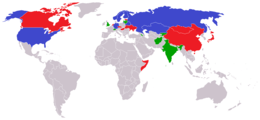Bandy World Championship
The Bandy World Championship is a competition between bandy-playing nations' men's teams. The tournament is administrated by the Federation of International Bandy. It is distinct from the Bandy World Cup, a club competition, and from the Women's Bandy World Championship.
| Sport | Bandy |
|---|---|
| Inaugural season | 1957 |
| No. of teams | 20 (last tournament, 2019) |
| Countries | Worldwide |
| Most recent champion(s) | |
| Most titles | |
| Official website | worldbandy.com |
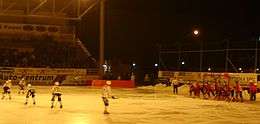
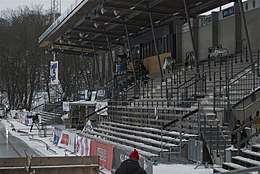
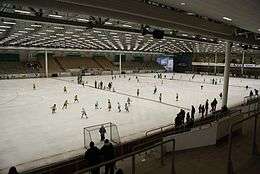
History
Although bandy has been played since the 19th century, the first men's world championships were only played as recently as 1957, and the first women's championships not until 2004. A bandy tournament was held as a demonstration sport at the 1952 Winter Olympics in Oslo, but this had no world championship status. A four nation tournament in 1954 was played in Moscow, this was the first time the Soviet Union met teams from other countries and the first time the new, jointly agreed rules were used, however this was not called a world championship. The international federation was founded in 1955 by the four countries which had played in Moscow.
The first ever Bandy World Championship was organised in 1957 in association with the 50th anniversary of the Ball Association of Finland, which at the time was the governing body of bandy in Finland. It was played at the Helsinki Olympic Stadium.[1]
From 1961-2003, the championships were played every two years, but since then has been played annually.
Participating nations
For a long time, only four countries competed at the world championships: the Soviet Union, Sweden, Finland and Norway, with the Soviet Union the dominating country. Since then, more countries have joined the tournaments, starting with the United States in 1985. The interest in the sport has spread to other parts of Europe, North America and Asia, and the dissolution of the Soviet Union in 1991 also opened the way for separate national teams from the former Soviet republics. Somalia became the first team from Africa to compete, in the 2014 tournament in Irkutsk.[2] The record number of participants is 20, set in 2019.
Denmark, Switzerland, Armenia and Poland are countries that a few years ago expressed interest in participating in future tournaments.[3] Denmark and Poland have left FIB, while Switzerland debuted in the 2019 edition, as did Great Britain.[4] Armenia wished to participate in the 2011,[5] but was not allowed to, as the tournament format at the time only allowed twelve teams and several more wanted to come. Of the countries which still have not taken part, India was also denied in 2011.[6] Most probably also Lithuania.[7][8] The reason for the 2011 tournament having only eleven teams, was a late cancellation from Australia,[9] another country no longer an FIB member.
With more nations competing, Group B was created in 1991. In 2012 there was a Group C for the first time as 14 countries participated. Group C was abolished in 2013, when instead two sub-groups of Group B were created. In 2014 there were two sub-groups also in Group A, increasing the number of teams in that division from six to eight. The number of groups is not fixed, it is changed from year to year and there are discussions about reinstating a Group C.[10] Japan and Kyrgyzstan attended their first World Championships in 2012, Ukraine joined in 2013, Germany and Somalia made their debuts in 2014, China in 2015, and the Czech Republic in 2016. Russia, Finland, Sweden, Kazakhstan, Norway, USA and Belarus usually play in group A. Until 2011, the best team in group B Went into a playoff match with the team which came bottom of the A-group, replacing them if they won. In 2004 the B-pool was played in a location separate from group A for the first time, at the City Park Ice Rink in Budapest. In 2013 this happened again as Vetlanda hosted the B-pool, whereas Vänersborg was the main venue of the A-pool with three matches played at other locations, Trollhättan, Gothenburg and Oslo. In 2015 and 2016 the tournaments were separated in time while in the same cities. The Division B matches are shorter in time, except for the end matches.
- Medeu was the main arena for the XXXIInd championships in 2012. Here the final of the 2011 Asian Winter Games.
- The reserve field of Almaty Central Stadium was the venue for Division B and C in 2012. Here Canada.
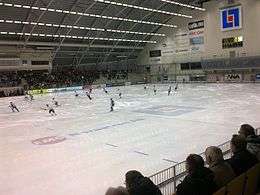 Arena Vänersborg in Sweden, the main venue of the XXXIIIrd championship, held in 2013
Arena Vänersborg in Sweden, the main venue of the XXXIIIrd championship, held in 2013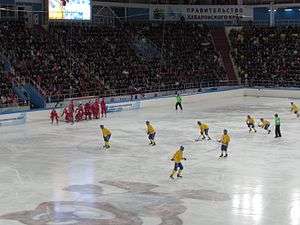 Arena Yerofey, the final of the XXXVIth championship in 2015
Arena Yerofey, the final of the XXXVIth championship in 2015
Participation details
| Team | 57 | 61 | 63 | 65 | 67 | 69 | 71 | 73 | 75 | 77 | 79 | 81 | 83 | 85 | 87 | 89 | 91 | 93 | 95 | 97 | 99 | 01 |
|---|---|---|---|---|---|---|---|---|---|---|---|---|---|---|---|---|---|---|---|---|---|---|
| part of Soviet Union | – | – | – | – | 7th | |||||||||||||||||
| – | – | – | – | – | – | – | – | – | – | – | – | – | – | – | – | 6th | 6th | 7th | 7th | – | – | |
| 2nd | 3rd | 2nd | 4th | 2nd | 3rd | 3rd | 3rd | 3rd | 3rd | 3rd | 3rd | 3rd | 3rd | 2nd | 2nd | 3rd | 4th | 3rd | 3rd | 2nd | 3rd | |
| – | – | – | – | – | – | – | – | – | – | – | – | – | – | – | – | 8th | 7th | 8th | 8th | – | – | |
| part of Soviet Union | – | 4th | 4th | 5th | 4th | |||||||||||||||||
| – | – | – | – | – | – | – | – | – | – | – | – | – | – | – | – | 7th | 8th | – | 9th | – | – | |
| – | 4th | 4th | 2nd | 4th | – | 4th | 4th | 4th | 4th | 4th | 4th | 4th | 4th | 4th | 4th | 4th | 3rd | 5th | 5th | 4th | 5th | |
| part of Soviet Union | 2nd | 2nd | 2nd | 1st | 1st | |||||||||||||||||
| 1st | 1st | 1st | 1st | 1st | 1st | 1st | 1st | 1st | 1st | 1st | 2nd | 2nd | 1st | 3rd | 1st | 1st | defunct | |||||
| 3rd | 2nd | 3rd | 3rd | 3rd | 2nd | 2nd | 2nd | 2nd | 2nd | 2nd | 1st | 1st | 2nd | 1st | 3rd | 2nd | 1st | 1st | 1st | 3rd | 2nd | |
| – | – | – | – | – | – | – | – | – | – | – | – | – | 5th | 5th | 5th | 5th | 5th | 6th | 6th | 6th | 6th | |
| Total teams | 3 | 4 | 4 | 4 | 4 | 3 | 4 | 4 | 4 | 4 | 4 | 4 | 4 | 5 | 5 | 5 | 8 | 8 | 8 | 9 | 6 | 7 |
| Team | 03 | 04 | 05 | 06 | 07 | 08 | 09 | 10 | 11 | 12 | 13 | 14 | 15 | 16 | 17 | 18 | 19 | 20 | Total |
|---|---|---|---|---|---|---|---|---|---|---|---|---|---|---|---|---|---|---|---|
| 6th | 7th | 6th | 6th | 6th | 6th | 6th | – | 7th | 7th | 6th | 7th | 6th | 6th | 8th | – | – | – | 15 | |
| – | 9th | 8th | 8th | – | 8th | 8th | 7th | 8th | 8th | 8th | 8th | – | – | 9th | – | 14th | – | 16 | |
| – | – | – | – | – | – | – | – | – | – | – | – | 15th | 16th | 17th | 12th | 18th | – | 5 | |
| – | – | – | – | – | – | – | – | – | – | – | – | – | 15th | 16th | – | 15th | 16th | 4 | |
| – | – | – | – | – | – | – | – | – | – | – | 15th | 12th | 9th | 7th | 7th | 7th | ● | 7 | |
| 8th | 10th | 10th | 12th | 12th | 10th | 9th | – | – | 12th | 11th | 10th | 9th | DSQ | 14th | 11th | 9th | ● | 16 | |
| 4th | 1st | 4th | 3rd | 3rd | 3rd | 3rd | 3rd | 2nd | 4th | 4th | 4th | 4th | 2nd | 3rd | 3rd | 3rd | ● | 40 | |
| – | – | – | – | – | – | – | – | – | – | – | – | – | – | – | – | 10th | – | 1 | |
| – | 8th | 11th | 9th | 10th | 13th | 13th | 10th | 10th | 9th | 10th | 11th | 10th | 10th | 10th | 8th | 11th | 9th | 17 | |
| – | – | – | – | – | – | – | – | – | 13th | 13th | 12th | 13th | 13th | 12th | 10th | 12th | 15th | 9 | |
| 3rd | 4th | 3rd | 4th | 4th | 4th | 4th | 4th | 4th | 3rd | 3rd | 3rd | 3rd | 4th | 5th | 4th | 4th | ● | 22 | |
| – | – | – | – | – | – | – | – | – | 14th | – | – | – | – | – | – | – | – | 1 | |
| – | – | – | – | 8th | 9th | 10th | 8th | 9th | 10th | 9th | 9th | 7th | 8th | – | – | 13th | 14th | 12 | |
| – | – | – | 11th | 11th | 12th | 12th | 11th | – | – | – | 14th | 14th | 12th | 11th | 13th | – | 12th | 11 | |
| 9th | 11th | 9th | 10th | 9th | 11th | 11th | 9th | 11th | 11th | 12th | 13th | 11th | 14th | 15th | 9th | 8th | 13th | 21 | |
| 5th | 5th | 5th | 5th | 5th | 5th | 5th | 5th | 5th | 5th | 5th | 5th | 5th | 5th | 4th | 6th | 5th | ● | 38 | |
| 2nd | 3rd | 2nd | 1st | 1st | 1st | 2nd | 2nd | 1st | 2nd | 1st | 1st | 1st | 1st | 2nd | 1st | 1st | ● | 23 | |
| – | – | – | – | – | – | – | – | – | – | – | – | – | – | – | 15th | 16th | 11th | 3 | |
| – | – | – | – | – | – | – | – | – | – | – | 17th | 16th | 17th | 18th | 16th | 20th | 18th | 7 | |
| 1st | 2nd | 1st | 2nd | 2nd | 2nd | 1st | 1st | 3rd | 1st | 2nd | 2nd | 2nd | 3rd | 1st | 2nd | 2nd | ● | 40 | |
| – | – | – | – | – | – | – | – | – | – | – | – | – | – | – | – | 19th | 17th | 2 | |
| – | – | – | – | – | – | – | – | – | – | 14th | 16th | – | 11th | 13th | 14th | 17th | 10th | 7 | |
| 7th | 6th | 7th | 7th | 7th | 7th | 7th | 6th | 6th | 6th | 7th | 6th | 8th | 7th | 6th | 5th | 6th | ● | 27 | |
| Total teams | 9 | 11 | 11 | 12 | 12 | 13 | 13 | 11 | 11 | 14 | 14 | 17 | 16 | 18 | 18 | 16 | 20 | 18 |
Competition format
Originally, the competition was played as an all-meet-all round-robin tournament. Starting in 1983, semifinals and a final was added to follow the round-robin stage.
When the number of participating nations increased, the championship was split up in two groups from 2003 onwards, A and B, with the better teams in Group A. The winner of Group B for some years played a game against the least successful team of Group A to determine qualification for Group A for next year, but in 2016, 2017, and 2018 winning Group B has been directly qualifying for group A for the following year while the last placed team of Group A is automatically relegated to Group B.
TV broadcasting
The interest is biggest in Sweden, Finland and Russia.[11] For a few times now it has been shown on Eurosport 2.
The games can also be followed in any country by streaming on the Internet.
Results
Medal table
Countries in italics no longer compete at the World Championships.
| Rank | Nation | Gold | Silver | Bronze | Total |
|---|---|---|---|---|---|
| 1 | 14 | 2 | 1 | 17 | |
| 2 | 12 | 19 | 8 | 39 | |
| 3 | 12 | 9 | 1 | 22 | |
| 4 | 1 | 8 | 22 | 31 | |
| 5 | 0 | 1 | 1 | 2 | |
| 6 | 0 | 0 | 6 | 6 | |
| Totals (6 nations) | 39 | 39 | 39 | 117 | |
Consecutive wins
The most consecutive gold medals were won by the Soviet Union with 11. Russia has won four consecutive gold medals and Sweden has won three consecutive gold medals.
References
- "The Finnish Bandy Federation, in English". Finnish Bandy Federation. Retrieved February 12, 2014.
- "Somali team seeking to be masters of ice sport bandy", BBC-online, 3 January 2014.
- 35-й чемпионат мира по хоккею с мячом стартовал в Хабаровске,(in Russian), Retrieved 5 February 2016
- A poster showing the flags of the registered teams for the 2011 tournament, including that of Australia, which in the end did not show up
- "World Championship will be broadcast on main TV channels". Archived from the original on 2015-07-09. Retrieved 2012-01-19.
External links
- "Results from the championships 1957-1999 by Per G. Olsson". Archived from the original on 2009-10-28. Retrieved 2006-02-03.CS1 maint: BOT: original-url status unknown (link)
